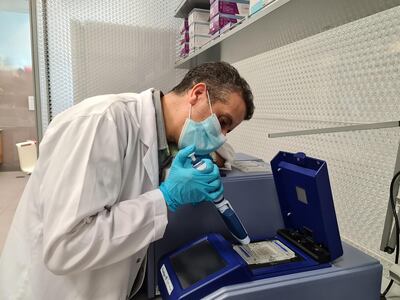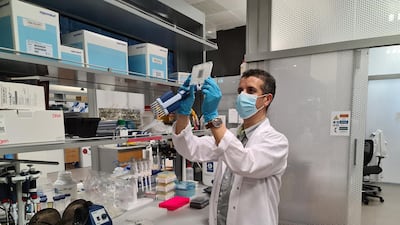A safer, cheaper and more effective saliva test for Covid-19 would boost detection rates if rolled out in the Emirates, according to a major UAE study into the nasal swab alternative.
Researchers at New York University Abu Dhabi said saliva screening has a greater accuracy than the commonly used Polymerase chain reaction (PCR) nasal tests currently used to identify the virus.
Similar checks have been trialled in the UK and Canada, with Abu Dhabi scientists claiming their research reduces the risk of false results and provides more accurate transmission rates.
The new test could be crucial in detecting signs of Covid-19 in asymptomatic carriers or those in the early stages of infection, said Youssef Idaghdour, the university’s assistant professor of biology.
“There has been a push to improve the existing methods and that is where saliva tests have come in,” he said.
“Collecting saliva is painless, less uncomfortable and limits exposure to the virus to healthcare workers as samples can be self collected.
“As there is no need to use a special collection tube, eliminating the need for special reagents, it is also cheaper.”
Saliva generally carries higher amounts of viral load, making it easier to spot.
There is also less risk of collecting defunct virus genetic material that can linger in the nose and throat and provide a false positive result.
The research has been supported by the Department of Health, Cleveland Clinic Abu Dhabi, the Mohammed Bin Rashid University Of Medicine and Health Sciences and other research facilities.
If approved, saliva testing could be introduced across the country within months.
Researchers at NYUAD used clinical samples to determine if the saliva test was more sensitive to detecting signs of the virus than a nasal or throat swab.

“We discovered our method was more sensitive, so that acted as the starting point for more research, said Mr Idaghdour.
“It is not an issue in patients with symptoms as the detection is clear.
“It (PCR testing) is a problem however when using this method to test patients with a low viral load at early stage of infection or who may be asymptomatic.
“Because of that we have developed a more sensitive method that will detect even the slightest sign of infection.
“This also reduces the risk of false negative tests.”
A recent study published in the New England Journal of Medicine found saliva specimens had at least similar sensitivities to nasopharyngeal tests.
Typically, results can be achieved on the same day as sample collection, usually just 5-6 hours later.
Those involved in the research said the test could be suitable for use anywhere in the UAE.
“A collection tube inside a ziplock back could be delivered to someone’s home, school or campus, then delivered to a lab for analysis,” said Mr Idaghdour.
“The beauty is the reduced risk of contamination.
“The DoH is looking at the data, as it has already been approved in other countries.”
Early detection is central to the UAE's efforts to stem the spread of Covid-19.
More than 9.5 million tests have been conducted to date, with testing figures rising steadily in recent weeks.
In June, more than 14,000 GP staff in the UK and other key workers and their families took part in a pilot study to check a similar “no swab” saliva test for Covid-19.
Coronavirus outbreak
Saliva tests for Covid-19 as accurate as nasal swabs, UAE study finds
Canada rolls out new Covid 'spit test' to allow for mass testing in schools
New saliva test could identify concussions in sport quickly
The four-week research led by Southampton University allowed people to collect their own sample at home by spitting into a pot before laboratory analysis.
The £100 billion “Operation Moonshot” programme in the UK aims to test millions of people for the virus by early 2021.
The Department of Health and Social Care invited businesses to tender for the production of some 3 million saliva collection kits a day, suggesting the process could be crucial to government targets.
Similar saliva tests have already been conducted on pupils at schools across British Columbia in Canada.
“These tests will simplify the process for everyone, at the point of collection and at the laboratory stage,” said Mr Idaghdour.
“The important thing is how do we reduce the costs involved without reducing sensitivity and this test does that very well.”








